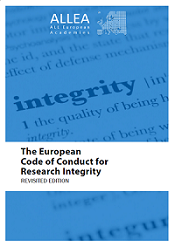All materials
None were found.

20 najpogostejših medbesedilnih napak v pisnih izdelkih študentov na Pedagoški univerzi v Freiburgu (Freiburg University of Education)
Published: 14.08.2019
A total of 82 term papers and final theses at Freiburg University of Education, Freiburg, Germany, were examined 2014 – 2016 in terms of their intertextual quality. Of the 109 distinctions made between different types of intertextual errors that are known to us, 58 were detected in the student

Kako se izogniti plagiatorstvu: parafraziranje, citiranje in povzemanje
Published: 14.08.2019
Plagiarism means that we take a work or an idea of someone else and present it as our own. To avoid plagiarism the document explains the basic concepts paraphrasing, quotation and summary. Please note that this material is very brief summary. It is not meant as a stand-alone learning material. It ma

Kje je meja med slabimi akademskimi praksami in plagiatorstvom?
Published: 14.08.2019
The exercise is intended to be used in the context of a learning unit on academic writing, referencing, academic integrity or introducing research skills. The students should read the eight specified cases and decide if they think this is a case of serious plagiarism, plagiarism, not plagiarism or

Kriteriji za določanje resnosti plagiatorstva
Published: 14.08.2019
Papers presented with intertextually incorrect passages must, first, be judged by decision makers and be identified as plagiarism. The next step would be the clarification of the severity of such a violation in relation to the institutional definitions of good academic practice. The criteria can aid

Ključna vprašanja za pomoč pri določanju intertekstualnosti in formalne kakovosti besedil ter domnevnega plagiatorstva
Published: 14.08.2019
These questions are set to help the assessors to identify the signs of plagiarism. This guide should be used as a whole to identify any potential plagiaristic behaviour.

Interpreting reports from text-matching software (teaching unit)
Published: 08.08.2019
This teaching unit is based on a case study. Its main target audience are graduate students whose native language is not English and who have been educated in their native language. It also applies to faculty and administrative staff who learn about the use and limitations of such softwares and thei

Introducing good citation practices (teaching unit)
Published: 06.08.2019
This 90-minutes student centred activity will focus on educating entry-level students to understand the good citation practice and plagiarism avoidance.

Enhancing good academic working habits (teaching unit)
Published: 06.08.2019
This course provides the opportunity for students to learn the concepts relating to required values and academic integrity for their studies. Using an interactive start, students will learn about the scope and nature of plagiarism and other academic malpractices. They will be expected to contribute

Avoiding unintentional plagiarism (teaching unit)
Published: 06.08.2019
After an explanation about referencing and quoting students watch the introductory video and discuss why it is important to acknowledge someone else’s work. Then, based on real life examples, they brainstorm on methods how to avoid (un)intentional plagiarism. Finally, teacher provides general

The European Code of Conduct for Research Integrity
Published: 06.08.2019
The linked webpage contains the links to the Code in all the above-mentioned languages. The European Code of Conduct for Research Integrity serves the European research community as a framework for self-regulation across all scientific and scholarly disciplines and for all research settings.